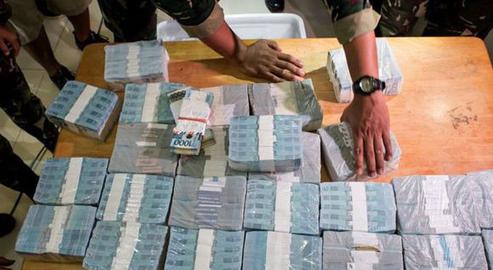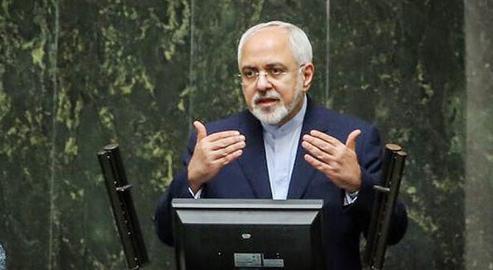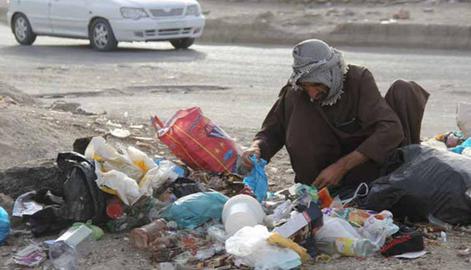The financial activities of the Islamic Revolutionary Guards Corps (IRGC), whether inside or outside Iran, can be summed up as various kinds of money laundering. The IRGC both organizes and financially supports opponents of the Financial Action Task Force (FATF), an intergovernmental organization that designs and promotes policies and standards to combat financial crime, including money laundering and the financing of terrorism.
In a question and answer session [Persian link] in the Iranian parliament on November 3, Foreign Minister Mohammad Javad Zarif once again spoke of organized money laundering by “lobbies” who have their own “special interests” in mind and take advantage of the troubled Iranian economy to enrich themselves.
Almost exactly a year ago, on November 11, 2018, in an interview [Persian link] with the news site Khabar Online, Zarif spoke of individuals and groups who launder money to the tune of billions of dollars. “In just one transaction they transferred 30 trillion tomans,” close to $2.7 billion, he had said.
On both days, Zarif’s purpose was to defend FATF’s conditions and to support passing laws required for joining FATF. And both times, the Iranian foreign minister complained that the corrupt money-laundering groups had organized an opposition to the bills. Without a doubt, he was referring to the media affiliates of the Revolutionary Guards and the influential agencies that function under the supervision of the Supreme Leader Ayatollah Khamenei; together, in the past two years, they have stopped at nothing to oppose joining FATF.
In his statements to parliament, Zarif did not name names. And in his interview last year he emphasized that he was not referring to any one specific entity. Nevertheless, he could not have been referring to any body other than the Revolutionary Guards, the biggest financial, military, political, security and media organization in Iran.
Inside Iran, there is virtually no sector of the economy free from IRGC’s widespread and opaque involvement. From construction, manufacturing and mining to the black market and illicit fringes of the economy, the Revolutionary Guards’ presence can be felt.
Outside Iran, too, most financial activities of the Revolutionary Guards violate international laws — from financially supporting terrorist groups to participating in organized criminal activities such as drugs smuggling.
Domestic Money Laundering
The reformist politician and the former first deputy of parliament, Behzad Nabavi, recently said [Persian link] that 60 percent of Iran’s national wealth is controlled by the Revolutionary Guards and three other entities under the control of the Supreme Leader. His claim led to many reactions – including from some who tried to say that it was the government (not the Guards) that controls more than 60 percent of Iran’s economy.
The problem with this argument is that part of the budget – whether the government’s budget, or the budgets of various companies – go directly or indirectly to the IRGC and entities controlled by the Supreme Leader. (It is also true that Nabavi did not offer any evidence for his claim or an explanation for how he had arrived at the number of 60 percent.)
Regardless of the exact share of the economic controlled by the Revolutionary Guards and entities controlled by the Supreme leader, there is no doubt that the share is large. There is no transparency in the ledgers of these entities and it is not clear how much their capital is worth, the source of their revenue, their expenses, their tax liability (although they do not pay taxes) and so on. The lack of transparency and tax evasion might be an inherent habit for the Revolutionary Guards and the entities under the Supreme Leader – but all around the world they are considered a form of money-laundering.
What is more, corruption in the financial dealings of the IRGC is an undeniable fact — from financial collusion for the sake of winning contracts to the forcible elimination of competitors and interference in political matters and political or official appointments. Moving unknown sums of money through unknown means to threaten, bribe or influence political and economic decisions are also a form of money-laundering; but they are also commonplace actions for the Revolutionary Guards and entities under the supervision of the Supreme Leader.
There is also extensive evidence of IRGC illegally smuggling goods and currency. At least two Iranian presidents have sarcastically called the Revolutionary Guards “brother smugglers,” including Mahmoud Ahmadinejad [Persian video]. Of course, nobody has seen IRGC’s ledgers, but it is highly unlikely that they would register such transactions as “income from smuggling goods and currency.” Instead, they would launder these transactions in a way that would remove any stain of the black market.
Foreign Money-Laundering
In an unprecedented move on April 8, 2019, the US officially designated the IRGC as a foreign terrorist organization. This meant that the United States now sees any financial dealing with the Revolutionary Guards as money-laundering and illegal. Just on October 30, the United States announced that six U.S. allies in the Persian Gulf — Saudi Arabia, Bahrain, Kuwait, Oman, Qatar and the United Arab Emirates — joined the United States in imposing sanctions on 25 entities associated with the Revolutionary Guards and Tehran's "regional proxy," the Lebanese Hezbollah. Now it was not only the US but also these regional countries that saw financial transactions with the IRGC as money-laundering.
But it is not only the US and a few countries bordering the Persian Gulf that designate the IRGC’s financial transactions as money-laundering. Many countries and international organizations view the financial support of the Revolutionary Guards for certain groups in countries from Syria, Iraq, Lebanon, Palestine to Yemen, Afghanistan and so on in the same light.
Even if the IRGC’s financial support for terrorist groups is set aside, their other financial activities outside Iran also fall under the category of money-laundering. The IRGC is an active player in the Iranian economy, and a large segment of Iranian banks and individuals engaged in foreign trade are, officially or unofficially, associated with the Revolutionary Guards or the previously mentioned powerful entities under the control of the Supreme Leader.
The IRGC also has special powers over the Iranian economy as a whole. For instance, in October there was news that $22 billion of Iranian currency reserves had disappeared [Persian link] and could not be accounted for.
But in response to criticism of President Rouhani’s economic policies, Vice President Eshagh Jahangiri recently pointed a finger at the Revolutionary Guards themselves.
“There are those who at one point took $22 billion of the country’s reserve to Istanbul and Dubai, claiming that this action would reduce the price of the dollar,” Jahangiri said sarcastically. “But neither the price of dollar has gone down nor we know what happened to that $22 billion.”
Of course, Jahangiri did not mention the IRGC by name but, like Zarif, he left no doubt about whom he was blaming. What other group in Iran has such power as to remove a sum almost twice that of Iran’s 2019 oil exports revenue and transfer it to its own financial network in neighboring countries?
Then there are other charges which are occasionally leveled at the Revolutionary Guards by some countries or international organizations – such as working with international drug cartels and smuggling networks. The IRGC may not be working directly with these cartels but it certainly plays a role in laundering their money in the west.
In any case, while the Iranian Central Bank and banking transactions are under sanctions, it is impossible to make large money transfers to the west without a powerful entity that is experienced in money-laundering. The IRGC, with its power, its network and its long experience in money-laundering, is exactly such an entity.
Related Coverage:
Are Revolutionary Guards’ Economic Activities Legal?, May 7, 2019
How Will Listing the Guards as a Terrorist Organization Change Iran?, April 19, 2019
Trump Designates Revolutionary Guards a Terrorist Organization, April 10, 2019
The IRGC Commercial and Financial Institutions: Khatam-al-Anbiya Construction Headquarters, April 9, 2019
The Cost of Iran’s Stubborn Refusal to Join International Treaties, November 5, 2018
The Humanitarian Cost of the IRGC's Involvement in a Bank, October 23, 2018
Iran Finally Signs Convention for the Suppression of the Financing of Terrorism, October 8, 2018
Rouhani Rewards Guards with Anti-Smuggling Operation in Persian Gulf, March 7, 2018
Money Laundering and Terrorism: Rouhani vs the Revolutionary Guards, September 7, 2016
visit the accountability section
In this section of Iran Wire, you can contact the officials and launch your campaign for various problems


























comments